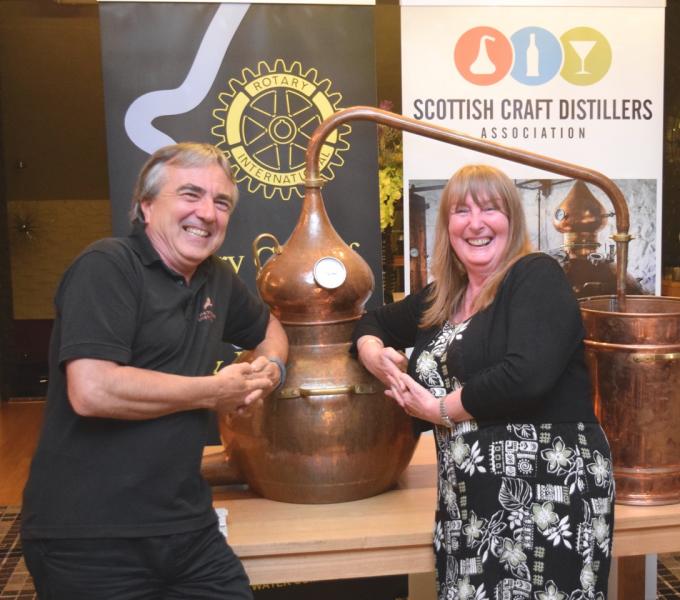Tony Reeman-Clarke - Micro distilling
Thu, Aug 27th 2015 at 6:00 pm - 9:00 pm
Strathearn Distillery, near the village of Methven in Perthshire, is probably Scotland"™s smallest whisky and gin distillery.
The distillery produces hand-crafted, artisan single cask, single malt whisky by using traditional methods and ideas.

Micro-Distilling in Scotland
When large copper containers connected by copper pipes were uncovered at last week’s meeting of the Bridge of Allan and Dunblane Rotary Club, the members” hearts rose and their taste buds tingled. Why was that? The answer: Tony Rheeman-Clark, the owner of what was (and may still be) Scotland’s smallest distillery was to enliven the meeting with an account of micro-distilling in Scotland.
The micro-distillery is a new phenomenon in Scotland – at least in the legal context. For generations, the image conjured up by small stills was the sound of Excise men tramping across the countryside looking for families illegally distilling alcohol in their homesteads. Now, a new generation of micro-distillers has emerged following acceptance by Her Majesty’s Revenue and Customs that smaller stills – much smaller than the usual 1600+ litres - can be licensed. The first of these, Tony’s own enterprise, was granted its licence in 2013 and started distilling in August of that year.
Following this more relaxed approach to the legislation, micro-distilling – or craft distilling as it is also known – has flourished. In the two years following the setting-up of Tony’s business, Strathearn Distilleries, 14 micro-distilleries have been established, with a further ten in the process of being formed. On the basis of this progress, it is estimated that together these businesses should generate in the region of £30 million.
Support from Scottish Enterprise and others has helped the development of the Scottish Craft Distillers Association, a trade association to promote small-scale distilling, of which Tony was appointed Chairman. At present, it acts as a one-stop shop for its 60 members, with initiatives such as a trade mission to Dubai, where the interests of all the craft distillers were collectively represented, a very cost-effective means of getting their products into large market places.
Tony then turned to the burnished copper apparatus sitting behind him on the table-top. This still, though very small, is capable of producing excellent whisky and gin, and can also be used for brewing beer. Indeed, this was the very still he used for his first experiments with the distillation of both gin and whisky.
It’s important to remember that before any distillation can be described and sold as whisky it has to mature in a cask for three years. So, Tony explained, to help with cashflow it makes sense to distil gin, which can be marketed shortly after production. So craft distillers are producing a range of Scottish gins, which have been very successful in breaking into the marketplace. These producers have different approaches to enhancing the taste and aroma of the gins, including using such ingredients as rock rose petals gathered locally by hand. Distilleries also offer various options for visits, including opportunities to work alongside the distillers and experience at first-hand the processes involved.
The ultimate proof of these efforts was provided by Tony: each member was given small samples of six Scottish craft gins. The variations in colour and aromas emphasised the individuality of the producers’ approach, with each having a unique taste. But, Tony insisted, gin on its own isn’t the final story: we need also to consider the importance of the mixer. Be bold, he suggested, in trying new combinations, which could include tonic, bitter lemon, fresh grapefruit juice or other ingredients. And don’t forget the slice of fruit which also has an effect on the overall taste of the drink, as has the environment in which you are drinking.
Without further encouragement, members did their own tastings, with questions flowing freely to Tony on various aspects of distilling and the business he runs.
Speaker’s Host, David Mackie thanked Tony for an insight into the world of micro-distilling which was both interesting and illuminating. The evening had been enlivened by members being able to get first-hand experience of the topic. For himself, he fondly remembered the enthusiasm in Navy wardrooms for pink gin, a regular panacea for the day’s ills. It was clear from members’ response that the evening had been a notable success.
President Mary Fraser echoed David’s thanks and welcomed several guests and a new member, Hugh McCrea, who had joined from another club.




